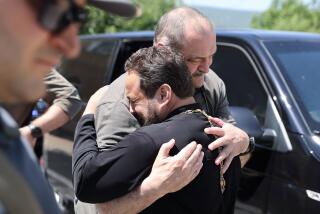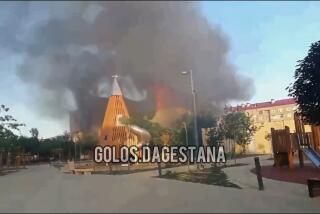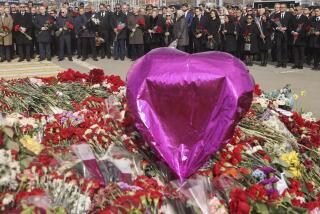Official in Caucasus Who Opposed Radical Islamists Is Slain in Blast
- Share via
MOSCOW — In a fresh setback to Kremlin policy in the troubled Caucasus region, a top official in Dagestan known as an opponent of radical Islamic ideology was assassinated Wednesday, authorities said.
Magomedsalikh Gusayev, Dagestan’s minister of ethnic policy, information and external relations, was killed after two attackers placed a magnetic bomb on the roof of his car as he was riding to work in the Russian republic’s capital, Makhachkala, police said.
Dagestan, which is predominantly Muslim, borders the war-torn Russian republic of Chechnya.
Gusayev, 52, had survived an assassination attempt in 2001, when he was injured by a bomb. In the years before and since, he led a fierce crackdown on a puritanical branch of Islam known as Wahhabism, which in the Caucasus Mountain region is associated with anti-Russian guerrillas.
Gusayev “was the one who almost single-handedly organized a campaign against religious extremists in Dagestan,” Abdulmanap Musayev, a spokesman for Dagestan’s police force, said in a telephone interview.
“In terms of influencing people’s minds and ways of thinking, Gusayev was probably the No. 1 person in the republic.”
Oleg Samayev, deputy editor of the Dagestanskaya Pravda daily newspaper, said by telephone that the attackers most likely were “Islamic radicals -- in other words, Wahhabists.” However, no one claimed responsibility for Wednesday’s attack.
Wahhabis believe in a strict interpretation of and adherence to the Koran. Some guerrilla groups in neighboring Chechnya are widely believed to be linked to the sect, which is prominent in Saudi Arabia. Adherents reject the name Wahhabi and say their faith is nothing more than orthodox Islam.
The Kremlin has often blamed the sect for violence in the region, charging that Chechen guerrillas used Wahhabi beliefs to motivate suicide bombers who carried out attacks in Chechnya and elsewhere in Russia this year.
Chechens exercised self-rule after defeating Russian troops in a 1994-96 war, but Russian forces returned in 1999 and have been fighting separatist guerrillas since.
International human rights groups say abuses by Russian forces cause resentment and anger among Chechens, fueling the conflict. Moscow has increasingly stressed ties between the guerrillas and radical Islam.
A Muslim religious court in Chechnya linked to guerrillas there issued a death sentence against Gusayev in 1999, said Samayev, the editor.
“It was at a time when Gusayev personally led a very tough and efficient campaign against Islamic radicals in Dagestan,” he explained. “The general view was that it was only Chechens and Arabs who tried to spread Wahhabism in Dagestan. Gusayev was the first official who openly said that there are also Dagestanis among radical Islamists, and we shouldn’t close our eyes and pretend this tendency doesn’t exist.”
The media blitz was followed by a ban on the practice of Wahhabism in Dagestan and a military crackdown to crush the Islamic movement in villages where its militants had become entrenched, Samayev said.
Ali Temirbekov, a spokesman for the Dagestani prosecutor’s office, said in a telephone interview that Wahhabism was being actively exported to the region from Saudi Arabia.
“Unfortunately there are many rich people there with radical ideas and more money than they know what proper use to put it to,” he said. “So they try with their money to build a base for radical Islam in the Caucasus. Gusayev was their ideological enemy No. 1 in Dagestan, and they must have been waiting only for a suitable moment to settle their score with him.”
Aslambek Aslakhanov, an ethnic Chechen member of Russia’s lower house of parliament and a candidate in a Kremlin-sponsored Chechen presidential election in October, described the assassination as “apparently the vengeance of the Wahhabis.”
The Chechen religious court reported to have issued the death sentence is believed linked to Shamil Basayev, one of the more radical guerrilla leaders, according to Russian media.
“They once again demonstrated that if they put somebody on their hit list, they will get him in the end, however long it may take them,” Aslakhanov said.
Gusayev’s death “is a tremendous and irreplaceable loss for the republic,” said Musayev, the police spokesman.
Times staff writer Sergei L. Loiko and Alexei V. Kuznetsov of The Times’ Moscow Bureau contributed to this report.
More to Read
Sign up for Essential California
The most important California stories and recommendations in your inbox every morning.
You may occasionally receive promotional content from the Los Angeles Times.










